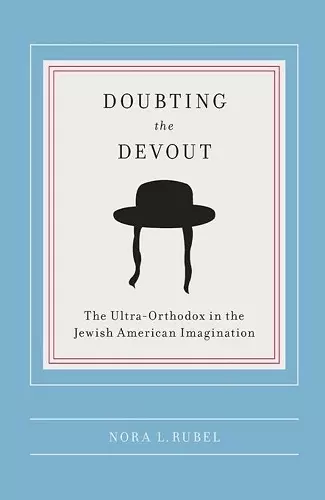Doubting the Devout
The Ultra-Orthodox in the Jewish American Imagination
Format:Hardback
Publisher:Columbia University Press
Published:19th Jan '10
Currently unavailable, and unfortunately no date known when it will be back

Doubting the Devout analyzes the representation of the Ultra-Orthodox (haredim) in popular Jewish American literary narratives, arguing that these narratives provide insight into the deep anxiety many in the mainstream Jewish community experience in relationship to the haredim. The book's great strength lies in its close reading of texts and the originality and boldness of the argument. Nora L. Rubel makes a significant contribution to the study of contemporary American Judaism. -- Rebecca T. Alpert, Temple University Provocative, disturbing, and deeply insightful, Doubting the Devout explores the anxiety over ultra-Orthodoxy in American Jewish life today. Penetrating into the writings that few before her have had the courage to scrutinize, Rubel exposes deep-seated fears that modern Jews--and those who read them--alternatively nourish, vanquish, or repress. -- Jonathan D. Sarna, Brandeis University, and author of American Judaism: A History Doubting the Devout reveals a fascinating--and persistent--phenomenon in American culture. Haredi Orthodox Jews, for decades relegated to obscurity by more liberal coreligionists who saw them as a reactionary link to European poverty, ignorance, and pariah status, have emerged as a delectable subject in American and Israeli novels, films, and popular culture. Rubel insightfully sketches several patterns in the artistic portrayal of ultra Orthodox Jews and links those portrayals to their social historical contexts. Haredim are sometimes portrayed as authentic in their countercultural rejection of Western materialistic success. More often, Rubel shows, Haredi men are depicted as hypocritical, manipulative chauvinists, exploiting the patriarchal power granted them by rabbinic law for their own purposes and kidnapping the system (and sometimes people). In contrast, Haredi women often play sympathetic roles, beginning as oppressed victims but frequently throwing off socioreligious shackles with heroic creativity. The pervasive fear of frumkeit (religiosity) may surprise some, as the emotionalism Rubel finds transcends mere arguments 'between liberalism and traditional societal formations,' articulated not only by 'secularists who are afraid that the ultra-Orthodox are stealing their kids,' but by traditionalists who worry, 'even if your kitchen is kosher, it might not be kosher enough for your own children.' -- Sylvia Barack Fishman, Brandeis University
Before 1985, depictions of ultra-Orthodox Jews in popular American culture were rare, and if they did appear, in films such as Fiddler on the Roof or within the novels of Chaim Potok, they evoked a nostalgic vision of Old World tradition. Yet the ordination of women into positions of religious leadership and other controversial issues have sparked an increasingly visible and voluble culture war between America's ultra-Orthodox and non-Orthodox Jews, one that has found a particularly creative voice in literature, media, and film. Unpacking the work of Allegra Goodman, Tova Mirvis, Pearl Abraham, Erich Segal, Anne Roiphe, and others, as well as television shows and films such as A Price Above Rubies, Nora L. Rubel investigates the choices non-haredi Jews have made as they represent the character and characters of ultra-Orthodox Jews. In these artistic and aesthetic acts, Rubel recasts the war over gender and family and the anxieties over acculturation, Americanization, and continuity. More than just a study of Jewishness and Jewish self-consciousness, Doubting the Devout will speak to any reader who has struggled to balance religion, family, and culture.
A lucid, well-written, and clearly argued book, -- Wendy Zierler H-Judaic Smart and perceptive book Jewish Book World Even if you've read none of the books Rubel discusses, hers is a worthwhile reflection on a major cultural divide in contemporary American judaism. -- Rachel Gordan Lillith
ISBN: 9780231141864
Dimensions: unknown
Weight: unknown
224 pages